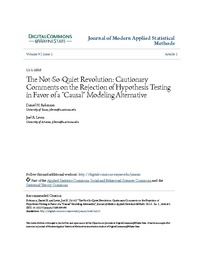
ATTENTION: The works hosted here are being migrated to a new repository that will consolidate resources, improve discoverability, and better show UTA's research impact on the global community. We will update authors as the migration progresses. Please see MavMatrix for more information.
Show simple item record
| dc.contributor.author | Robinson, Daniel H. | |
| dc.contributor.author | Levin, Joel R. | |
| dc.date.accessioned | 2017-09-15T20:47:34Z | |
| dc.date.available | 2017-09-15T20:47:34Z | |
| dc.date.issued | 11-1-2010 | |
| dc.identifier.citation | Published in Journal of Modern Applied Statistical Methods 9(2):332-339, November 2010 | en_US |
| dc.identifier.issn | 1538 – 9472 | |
| dc.identifier.uri | http://hdl.handle.net/10106/26928 | |
| dc.description.abstract | Rodgers (2010) recently applauded a revolution involving the increased use of statistical modeling
techniques. It is argued that such use may have a downside, citing empirical evidence in educational
psychology that modeling techniques are often applied in cross-sectional, correlational studies to produce
unjustified causal conclusions and prescriptive statements. | en_US |
| dc.language.iso | en_US | en_US |
| dc.publisher | Digital Commons@WayneState | en_US |
| dc.publisher | Wayne State University Press | en_US |
| dc.subject | Statistical modeling | en_US |
| dc.subject | Modeling techniques | en_US |
| dc.subject | Correlational studies | en_US |
| dc.subject | Educational psychology | en_US |
| dc.title | The Not-So-Quiet Revolution: Cautionary Comments on the Rejection of Hypothesis Testing in Favor of a “Causal” Modeling Alternative | en_US |
| dc.type | Article | en_US |
| dc.publisher.department | Department of Curriculum and Instruction, The University of Texas at Arlington | en_US |
| dc.identifier.externalLink | http://digitalcommons.wayne.edu/jmasm/vol9/iss2/2 | |
| dc.identifier.externalLinkDescription | The original publication is available at Article DOI | en_US |
| dc.identifier.externalLinkDescription | The original publication is available at the journal homepage | en_US |
| dc.rights.license | Published open access through DigitalCommons@WayneState | |
| dc.identifier.doi | DOI: 10.22237/jmasm/1288584060 | |
Files in this item
- Name:
- Not-So-Quiet Revolution_ Cautionary ...
- Size:
- 442.4Kb
- Format:
- PDF
- Description:
- PDF
This item appears in the following Collection(s)
Show simple item record


